calsfoundation@cals.org
George Hosato Takei (1937–)
George Hosato Takei gained international fame as Lieutenant Sulu in the original Star Trek television series and six movies. When he was a boy, he and his family were held in the War Relocation Authority Camp in Rohwer (Desha County).
George Takei was born on April 20, 1937, in Los Angeles, California. His father, Takekuma Norman Takei, immigrated to the United States from Japan at age thirteen, graduated from Hills Business College in San Francisco, and owned a cleaning shop in the Wilshire corridor of Los Angeles. His mother, Fumiko Emily Nakamura Takei, was a native U.S. citizen who was educated in Japan.
In 1942, after the outbreak of World War II, President Franklin D. Roosevelt issued Executive Order 9066, which led to the forced relocation of Japanese Americans from the West Coast. As part of the relocation, four-year-old George, his parents, and his younger brother and sister were moved from California to the Rohwer Relocation Center in 1942. The family members lived in Arkansas about eight months. Following the refusal of Takei’s parents to swear loyalty to the United States, the family was moved to the maximum-security camp at Tule Lake, California, where they stayed until being released in 1946. Takei has written of several memories of his time at Rohwer, including moving to and from Rohwer, playing games with his friends, and seeing a hog for the first time.
After graduating from Los Angeles High School in 1956, Takei enrolled at the University of California at Berkeley but transferred to the University of California at Los Angeles (UCLA) to study acting, and he graduated with a BA in theater in 1960. He soon began making guest appearances on television.
While studying for a master’s degree in theater arts at UCLA, which he received in 1964, Takei was cast in the role of Hikaru Sulu in a pilot for the television series Star Trek. He portrayed Sulu for three seasons, from 1966 to 1969, and in six movies between 1979 and 1991. Takei also appeared in other films, including Majority of One (1962), P. T. 109 (1963), The Green Berets (1968), Which Way to the Front? (1970), Return to the River Kwai (1989), Prisoners of the Sun (1990), Live By the Fist (1993), Trekkies (1997), and Mulan (1998). In addition, he has done voice acting for television shows such as Archer and movies such as Kubo and the Two Strings (2016).
Takei has been active in civic and community affairs. He was a delegate to the 1972 Democratic National Convention in Miami Beach, Florida, and ran unsuccessfully for a seat on the Los Angeles City Council in 1973. He served on the board of directors of the Southern California Rapid Transit District from 1973 to 1984, was vice president of the American Public Transit Association from 1978 to 1980, and is a member of the National Japanese American Citizens League and the Association of Asian Pacific American Artists. He is also Chairman Emeritus of the Board of Trustees of the Japanese American National Museum.
In 2003, Takei returned to the Rohwer site to assist in preserving the history of the state’s relocation camps. He returned to the state in 2004 to participate in the symposium on Japanese American experiences in Arkansas during World War II that was part of the four-day event, “Life Interrupted: The Japanese American Experience in World War II Arkansas,” that took place September 23–26, 2004.
In October 2005, he announced that he is gay and had been with his partner, Brad Altman, for eighteen years. On September 14, 2008, he and Altman were married in the wake of the California Supreme Court’s ruling legalizing same-sex marriages. In 2009, the couple appeared as the first gay couple on The Newlywed Game; they won. An outspoken proponent of gay rights, Takei received the Equality Award from the Human Rights Campaign in 2007 and the American Humanist Association’s LGBT Humanist Award in 2012.
In 2012, he returned to Arkansas to narrate Arnold Schoenberg’s A Survivor from Warsaw with the Arkansas Symphony Orchestra. Later that year, he starred in Allegiance, a musical set during the Japanese American internment. He also appeared as one of the celebrities on the twelfth season of The Apprentice and had a recurring role in the NBC television show Heroes. He was also the subject of the 2014 documentary To Be Takei.
In November 2012, Takei published the book Oh Myyy! (There Goes the Internet), which details his experiences with social media. The following year, he published Lions and Tigers and Bears: The Internet Strikes Back. In 2019, he published They Called Us Enemy, a graphic novel account of his experiences at Rohwer; it was co-written with Justin Eisinger and Steven Scott and featured art by Harmony Becker.
Takei lives in Los Angeles, and his interests include running, architecture, and historic preservation.
For additional information:
“From Star Trek to LGBT Spokesman, What It Takes ‘To Be Takei.’” NPR Fresh Air, July 28, 2014. http://www.npr.org/2014/07/28/335945625/whats-it-like-to-be-takei-george-takei-offers-a-glimpse (accessed December 2, 2020).
George Takei. http://www.georgetakei.com (accessed December 2, 2020).
Harrison, Eric E. “Sector Ready for Star Trek’s Takei.” Arkansas Democrat-Gazette, February 19, 2012, pp. 1E, 3E.
Hattenstone, Simon. “‘There Was One Prima Donna on Star Trek’: George Takei on William Shatner, Love and Life as an ‘Enemy Alien.'” The Guardian, November 28, 2022. https://www.theguardian.com/stage/2022/nov/28/star-trek-george-takei-on-william-shatner-love-and-life-as-an-enemy-alien (accessed November 28, 2022).
Inada, Lawson Fusao, ed. Only What We Could Carry: The Japanese Internment Experience. Berkeley, CA: Heyday Books, 2000.
Pasulka, Nicole. “George Takei, the Best Driver in the Galaxy.” Mother Jones, September/October 2012. Online at http://www.motherjones.com/media/2012/09/interview-george-takei-sulu-star-trek-gay-internment-allegiance (accessed December 2, 2020).
Provost, Philip M. “Dreams of a Truer Democracy: An Interview with George Takei.” Arkansas Times, February 22, 2012, p. 26. Online at http://www.arktimes.com/arkansas/george-takei-dreams-of-a-truer-democracy/Content?oid=2081990 (accessed December 2, 2020).
Takei, George. To the Stars: The Autobiography of George Takei, Star Trek’s Mr. Sulu. New York: Simon & Schuster, 1994.
Takei, George, Justin Eisenberger, Steven Scott, and Harmony Becker. They Called Us Enemy. Marietta, GA: Top Shelf Productions, 2019.
Jeff Bailey
Arkansas State University
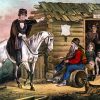 Arts, Culture, and Entertainment
Arts, Culture, and Entertainment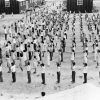 Japanese American Relocation Camps
Japanese American Relocation Camps Literature and Authors
Literature and Authors World War II through the Faubus Era, 1941 through 1967
World War II through the Faubus Era, 1941 through 1967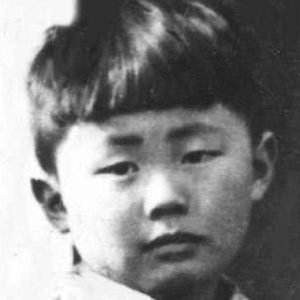 George Takei
George Takei 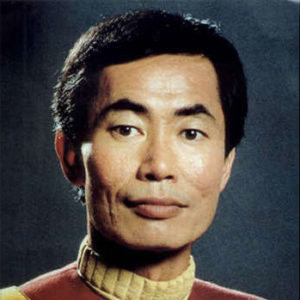 George Takei
George Takei 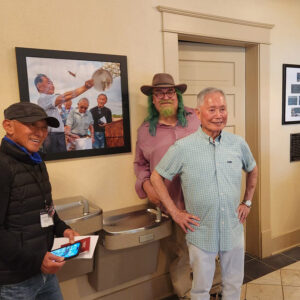 George Takei at Internment Museum
George Takei at Internment Museum 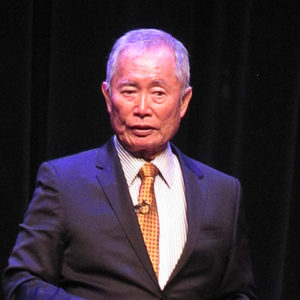 George Takei
George Takei 




Comments
No comments on this entry yet.